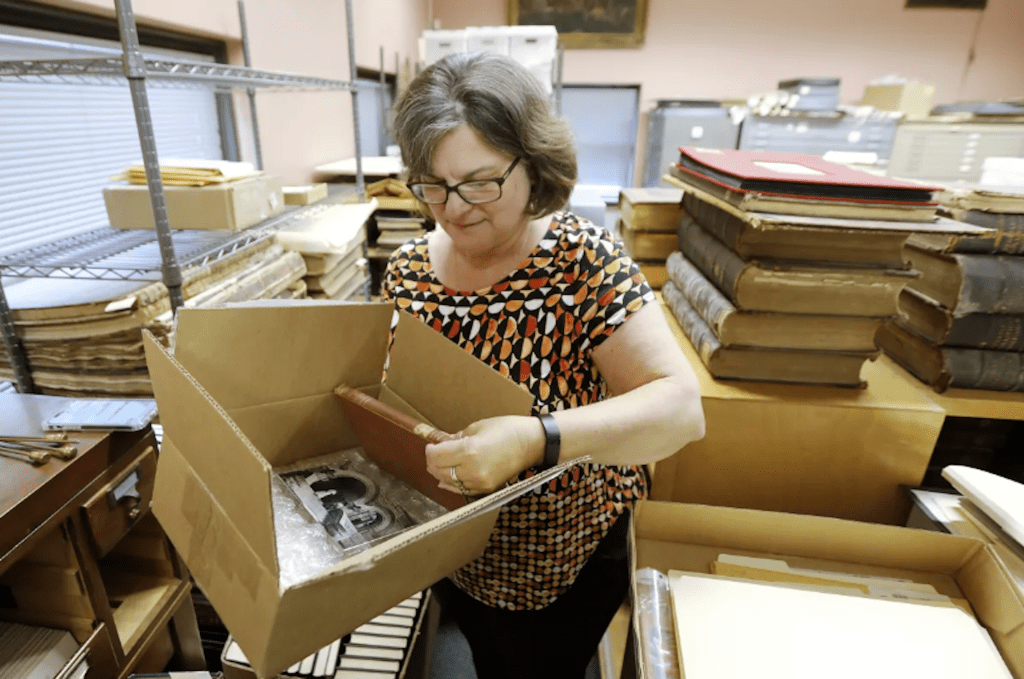News of the weird: Extremely overdue book returned to Massachusetts library 119 years later
Published 10:32 am Sunday, July 9, 2023

- New Bedford Public Library Director Olivia Melo pulls the overdue book from a box shipped to New Bedford, Mass., from West Virginia University Library on Friday. “An Elementary Treatise on Electricity” by James Clerk Maxwell was returned to the West Virginia University library 119 years after it was taken out of the New Bedford library.
BOSTON — On Feb. 14, 1904, someone curious about the emerging possibilities of a key force of nature checked out James Clerk Maxwell’s “An Elementary Treatise on Electricity” from the New Bedford Free Public Library.
It would take 119 years and the sharp eyes of a librarian in West Virginia before the scientific text finally found its way back to the Massachusetts library.
The discovery occurred when Stewart Plein, the curator of rare books at West Virginia University Libraries, was sorting through a recent donation of books.
Plein found the treatise and noticed it had been part of the collection at the New Bedford library and, critically, had not been stamped “Withdrawn,” indicating that while extremely overdue, the book had not been discarded.
Plein contacted Jodi Goodman, the special collections librarian in New Bedford, to alert her to the find.
“This came back in extremely good condition,” New Bedford Public Library Director Olivia Melo said Friday, July 7. “Someone obviously kept this on a nice bookshelf because it was in such good shape and probably got passed down in the family.”
The treatise was first published in 1881, two years after Maxwell’s death in 1879, although the cranberry-colored copy now back at the New Bedford library is not considered a rare edition of the work, Melo said.
The library occasionally receives books as much as 10 or 15 years overdue, but nothing anywhere close to a century or more, she said.
The treatise was published at a time when the world was still growing to understand the possibilities of electricity. In 1880, Thomas Edison received a historic patent embodying the principles of his incandescent lamp.
When the book was last in New Bedford, the nation was preparing for its second modern World Series, incumbent Republican President Theodore Roosevelt was on track to win another term, Wilbur and Orville Wright had conducted their first airplane flight just a year before and New York City was celebrating its first subway line.
The discovery and return of the book is a testament to the durability of the printed word, especially in a time of computerization and instant access to unfathomable amounts of information, Melo said.
“The value of the printed book is it’s not digital, it’s not going to disappear. Just holding it, you get the sense of someone having this book 120 years ago and reading it, and here it is in my hands,” she said. “It is still going to be here a hundred years from now. The printed book is always going to be valuable.”
The New Bedford library has a 5-cent-per-day late fee. At that rate, someone returning a book overdue by 119 years would face a hefty fee of more than $2,100. The good news is the library’s late fee limit maxes out at $2.
Nevada license plate that’s short for ‘Go back to California’ is revoked by DMV
RENO, Nev. — A revoked Nevada license plate that was meant to “drive away” Californians is getting one last chance to go back on the streets.
The plate — which reads “GOBK2CA,” short for “Go back to California” — was recalled by the state Department of Motor Vehicles in May after it received a complaint, KOLO-TV first reported. Now the vehicle owner is appealing the recall and will have a hearing on Wednesday, July 12, according to the Reno-area news station.
A section of the Nevada Administrative Code applied to the recall prohibits defamatory references to a person or group.
“In this case, the defamed group is Californians,” DMV spokesperson Eli Rohl told the Las Vegas Review-Journal. He adding that the department “regularly” turns down license plates that share the same message.
A special license committee meets every Monday to review reported license plates, before determining which ones violate Nevada statute.
The DMV reviewed more than 700 license plates from July 2022 to early March. Denied license plates include the puzzling “GGGGGGG,” the overly rude “U 1D1OT” and many no-so-subtle allusions to profanity, according to KLAS-TV in Las Vegas.
Lavish tomb in ancient Spain belonged to a woman, not a man, new research shows
WASHINGTON — When archaeologists first discovered the 5,000-year-old ornate tomb in Spain, they assumed it was for a man. It held a rock crystal dagger, ivory tusks and other lavish items. But now they’ve determined the remains are those of a woman, and all it took was two teeth.
The researchers used a new method of determining sex that analyzes tooth enamel. This technique, developed about five years ago, is more reliable than analyzing skeletal remains in poor condition, according to their study published Thursday, July 6, in the journal Scientific Reports.
Most details about the life of the “Ivory Lady,” as researchers dubbed her, remain a mystery but there are some clues.
“She was buried alone in a tomb with very special artifacts,” said Leonardo Garcia Sanjuan, a co-author and archaeologist at the University of Seville in Spain. “That shows that she was a special person.”
The tomb is located a few miles west of Seville, near Spain’s southern coast, and was excavated in 2008. Archaeologists thought it contained a young man based on an examination of the poorly preserved bones and the fact that several precious items found in the tomb — including ostrich eggshells and amber along with the tusks and dagger — indicated that the individual held a high social status.
The new technique detects differences in the chemistry of tooth enamel between males and females and can be used even when full DNA is not available.
“This research provides one more piece of evidence questioning old historical narratives,” said Alison Beach, an historian at the University of St. Andrews in Scotland, who was not involved in the study. It shows that “it’s not exclusively true that men have always been the most revered or held the most authority.”
Marta Cintas-Pena, a co-author and archaeologist at the University of Seville, maintains a database of Copper Age burials found at 21 different archaeological sites on the Iberian Peninsula, which includes Spain and Portugal. It currently has records for 1,723 individuals.
“The Ivory Lady’s burial stands out, head and shoulders, above everyone else — there is absolutely no known male or female burial that compares to hers,” said Garcia Sanjuan.









